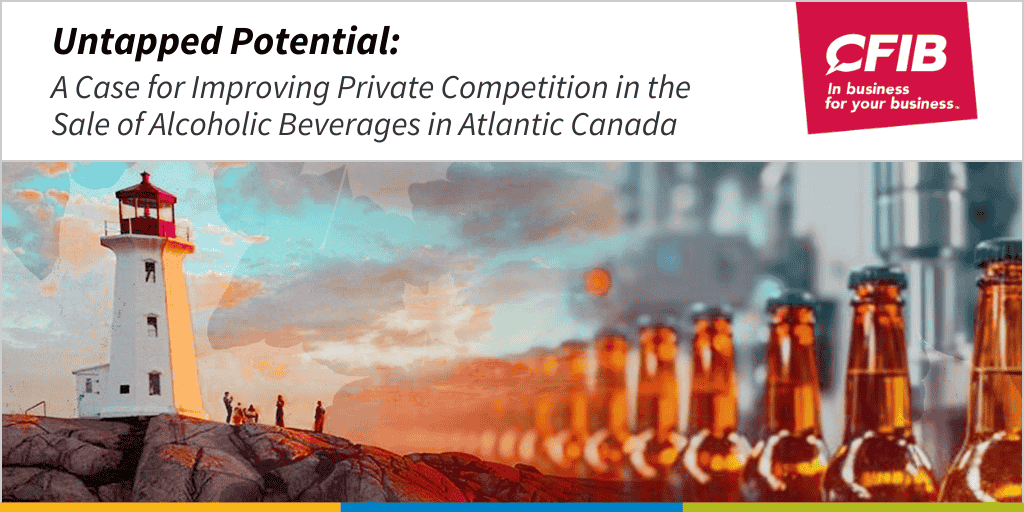
This report outlines the potential benefits for local small businesses and producers if the Atlantic provinces expanded private options for alcohol sales to retail small businesses. Such a change would not be radical; it would simply bring the region in line with the rest of Canada. Key findings include:
Private alcohol sales vary widely across Canada. Alberta and Saskatchewan have fully private retail systems where the province only acts as a wholesaler. Ontario and Quebec allow small businesses, such as convenience stores, to sell select alcoholic beverages. British Columbia uses a mixed public–private model. Manitoba, New Brunswick, and Newfoundland and Labrador permit only limited private sales. Nova Scotia and Prince Edward Island maintain a government monopoly on alcohol sales, apart from heavily regulated agency stores.
Nearly 8 in 10 (77%) Atlantic Canadian small businesses want their governments to allow private retailers, such as convenience stores, gas stations, and grocery stores to sell alcoholic beverages.
Allowing retail small businesses to sell alcoholic beverages has the potential to support these businesses by attracting more customers at a time where close to 5 in 10 small business across Atlantic Canada cite lack of demand as a top impact to their business.
The Financial Accountability Office of Ontario found that moving to a model with added private retailers in their province had the potential to add $353 million in net income to the Liquor Control Board of Ontario by 2030, driven by wholesale activity to private retailers.
Beyond allowing additional private retailers, Atlantic Provinces could support local retail small businesses and producers by modernizing how alcoholic beverages are sold in the province. This could be in the form of introduce cross selling, no-touch-no-tax policies that are currently being used in other jurisdictions or unilaterally implementing Direct-to-Consumer (DTC) interprovincial sale of alcohol.
In addition to improved private competition, CFIB is also recommending other policies that would modernize how alcoholic beverages are sold in the region:
- Directo-to-Consumer Sale (DTC): Atlantic Provinces should move forward with DTC shipment of alcoholic beverages inter provincially unilaterally as is being done in Manitoba rather than depending on memorandums of understanding (MOUs or individual agreements that could result in a patchwork of 80 separate agreements.
- Cross-Selling: Cross-selling policies allow local producers such as breweries, cideries, and wineries to sell other locally produced alcoholic beverages, as currently seen in New Brunswick. By allowing local producers to support local, provinces can increase the competition in the market while also expanding and bolstering the local industry.
- No-Touch-No-Tax: For sales methods where the provincial alcohol authority’s distribution network is not used, such as direct sales to restaurants and other businesses as well as direct sales to consumers, there should be no markup charged. This would provide much-needed tax relief and also provide an incentive for local producers to develop distribution chains.
- Improved Data and Transparency: Governments should consider publishing or providing support to local association to publish online tools for consumers to easily find local breweries and other alternatives to their province’s alcohol authority. For example, the Government of Ontario recently published an interactive map that helps consumers find nearby stores to purchase local alcoholic beverages.
Related Documents
| Release date | Report | Download |
|---|---|---|
| September 2025 | Untapped Potential: A Case for Improving Private Competition in the Sale of Alcoholic Beverages in Atlantic Canada |
PDF (8.7 MB) |

 Share Article
Share Article
 Print Article
Print Article
